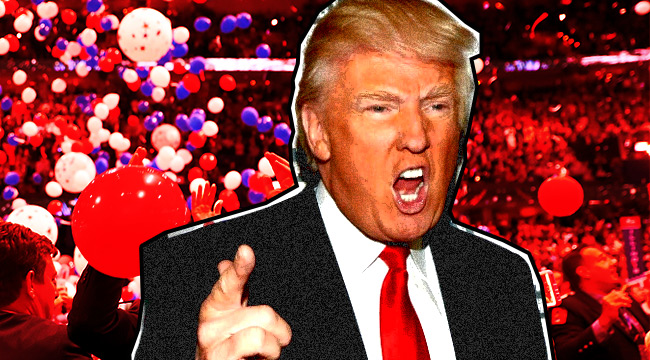
Donald Trump has had a rough week on the campaign trail. Formerly friendly TV personalities have turned on him after he doubled down on attacking the family of a fallen soldier. There have been embarrassing disclosures from Trump’s business interests. It has some in the party wondering if they can turn the tables on Trump and fire him from the job of candidate. So is it possible to fire Trump?
It’s certainly possible Trump could be removed, although the RNC couldn’t do it directly. The Republican National Committee isn’t a government organization, but a private group that operates following election law. Its job is essentially to handle the day to day work of politics; raising and distributing funds, coordinating election strategy, and all the other cogs and gears a political party needs to run its operation behind the scenes.
The question is just how this theory could be put into practice. There’s no mechanism for getting rid of a candidate, so Trump would have to voluntarily withdraw. The committee could certainly nudge Trump down this path by, say, cutting him off from GOP resources. That would be a move that likely ends the political careers of most of the committee, and might even set off more political infighting. But say it works, and Trump quits. Then what?
Who Would Replace Trump?
If Trump does quit, then the RNC would bring its members together to stage a sort of mini-convention. There’s one member for each state, and their votes would be weighed by how many delegates each state had at the Cleveland convention. The real question, though, is who would they vote for?
The 2016 Republican race for president had a staggering 17 candidates, including Trump. Trump was never the overwhelming favorite in those primaries, and if you look at poll tracking, whenever a candidate left the race, somebody else‘s stock rose. There’s a compelling argument that Trump won because the GOP couldn’t choose somebody, anybody else, to push, so voters went with the most visible candidate.
If Trump leaves, that essentially puts the RNC right back where it started, with a pile of candidates nobody particularly likes. Even worse, they would be asking whoever they did choose to be a sacrificial lamb. Assuming Trump’s resignation was a speedy and quiet affair and the party’s leadership managed to quickly unite around a candidate, both of which seem unlikely, this person would have a little less than three months to raise funds, coordinate operations, and try to at least make a credible bid against Hillary Clinton. This also assumes that all the politicians and party leadership who have supported Trump would unite behind this completely theoretical candidate and that Trump wouldn’t follow through with his threat of an independent campaign.
Should Trump Be Replaced?
In the end, it comes down to what the RNC believes is the path least likely to hurt their candidates elsewhere on the ticket. Rebelling against Trump would almost certainly be a circus and have the potential to derail congressional and senatorial primaries over infighting. Trump’s refusal to endorse Paul Ryan or John McCain as a show of party unity has arguably done that already.
And, of course, there’s the chance they could retake the White House. While Trump has had a bad week, Clinton could certainly have problems herself, or something else may change the course of the election. So really it comes down to just how much faith the RNC has in Trump, and whether that faith will be justified come November.
